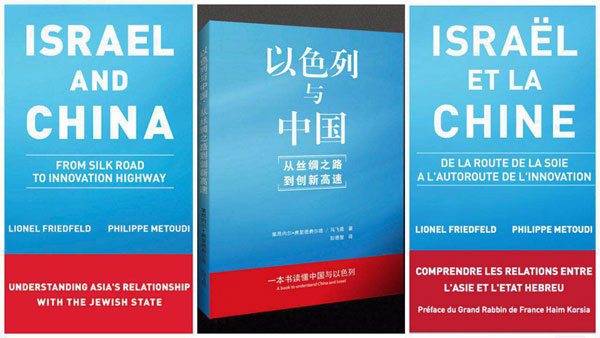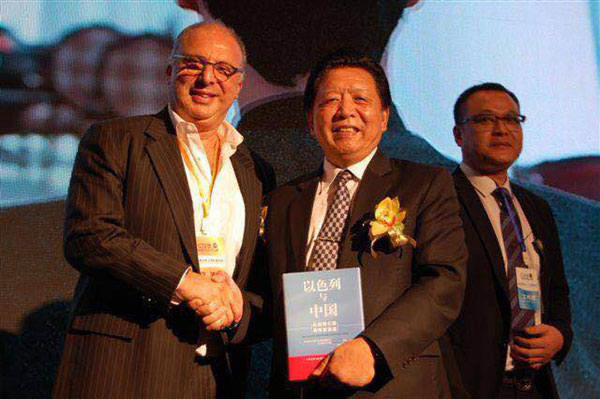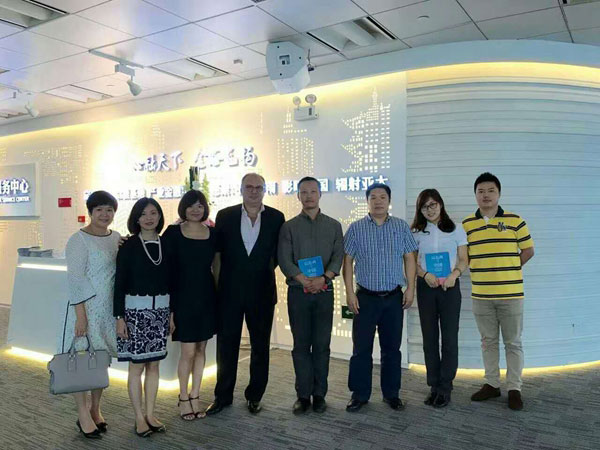Israel and China—From Silk Road to Innovation Highway Photos: Courtesy of Philippe Metoudi
Philippe Metoudi and his partner Lionel Friedfeld have co-authored Israel and China—From Silk Road to Innovation Highway, which is recognized by critics as the first book that explores into the heart of Israel-China relationship.
Despite being mainly business-related, the book compiled by two investment bankers targets more than just Chinese outbound investors who identify Israel as a destination. “We aim to explain to all curious Chinese readers who have only vague ideas about Israel,” said Metoudi.
Sino-us.com recently sat down with Metoudi, a veteran banker from France and now based in Hong Kong, to discuss the subject.
A perfect match
According to Metoudi, the book idea emerged from his work for Chinese companies making investment in Israel over the last few years. He calls it strategic investment. “Israel, identified as one of the leading innovation centers in the world, has been extremely willing to help China with their disruptive technologies. And Chinese companies have been making investments in Israeli companies with the aim to bring their technology into China,” he explained.
Although China is known to excel at Internet-related technologies, Metoudi said, there obviously is room for improvement in the agricultural, medical, water-related and some hi-tech sectors like robotics. And Israel boasts the most cutting-edge technologies in the areas.
“When we bring clients to Israel, we don’t only show them technology. We want them to understand why Israel is so strong at innovation. So, we would bring them to universities to show them the country’s historical and cultural sides.”
He revealed that one of his Chinese clients from Shenzhen suggested that information is fascinating and Metoudi and his partner write a book about it. That conversation finally inspired the compilation of the book Israel and China—From Silk Road to Innovation Highway which has been published in three languages (English, Chinese and French).
Philippe Metoudi with Jin Shousong, chairman of the board of ZJBT international group
“If you want to know where you are going, you must know where you have come from,” reads the first sentence of the book. Dan Catarivas, first economic counselor of the Israeli Embassy in Beijing, commented, “Learning and knowing the past is essential for building the future! I congratulate the authors on adding a new perspective to understanding the complexity of relations between Israel and China.”
Metoudi has been a banker his whole life. Beginning 2016, he has also become a lecturer on Israel-China relationship at the Renmin University of China. “I’ve got three passions in life—family, Israel, and China. So, it’s natural for me to try to match the two countries,” he told sino-us.com.
He observes that China, as the world’s manufacturing engine, needs to address the problem of rapid wage growth. Technologies imported from Israel, which resembles the Silicon Valley, would enable China to manufacture higher-value-added products and absorb the rising labor costs.
“So, the two countries would be a perfect match for each other.” Metoudi also noted that unlike western countries like France where he is from, Israeli business communities and public sincerely welcome investment from China, with no concerns that Chinese investment may pose a threat.
Incredible similarities between two peoples
Metoudi has worked and lived in Hong Kong since 1989 and commuted to the Chinese mainland on a regular basis. “I’ve never really experienced cultural shocks in Hong Kong or Chinese mainland, and that makes me realize there are so many similarities between Jewish and Chinese people. For example, we value education, cherish family and have a respect for the elderly.”
And he found out what’s happening between the two countries—the surging exchanges of people and goods—did not just start five, 10 or 20 years ago. Instead, the link has been there for over 1,000 years - back to the days of Marco Polo when he recorded in his travelogue that most merchants he met in China were Jewish people from India, Persia and Iraq. Metoudi joked that the ongoing One Belt, One Road policy advocated by President Xi Jinping was implemented by Jewish people thousands of years ago when they were forced to leave Jerusalem to emigrate to Persia (now Iran), India and China.
For more proof for the incredible similarities, Metoudi recommended readers to refer to one chapter of the book titled Spirituality, the Continuous Search for Wisdom, which is also his favorite chapter. “It is through working on the part of the book, I found out that we have much more in common than we could have imagined.”
The part introduces to Chinese readers Jerusalem-based Rabbi Adin Steinsaltz, one of the leading scholars in the contemporary Jewish world. Rabbi Steinsaltz also is the leading expert on comparing and contrasting Jewish and Chinese thought. He translated and published one of the most important books of the Jewish tradition, Pirkei Avot (“Ethics of the Fathers”), into Chinese.
And one of his lectures, which was given in 1996 in Beijing, comparing Jewish and Chinese philosophy and culture clearly reveals that not only do Jews and Chinese have many values and principles in common, but these two ancestral people also have very successfully managed to preserve and apply their ancient wisdom and tradition in today’s modern, innovative world.
Metoudi noted that Rabbi Steinsaltz highlights hundreds of parallels between Chinese and Jewish philosophy.
“It’s amazing that we have come up with the same philosophy. When works like the Ethics of the Fathers were composed, Confucius and Lao-tzu, the Chinese philosophers have composed almost identical sentences. With such a long distance between us, it’s impossible for one to copy the other.”
Probably based on the many similarities in culture, mentality and values, Jewish and Chinese people never intended to convert each other from the very beginning. “There have never been Jewish missionaries to China, as opposed to Christian missionaries. And the Chinese have never tried to change the culture of the Jews, for example the oldest Jewish community in China’s ancient capital city of Kaifeng. They could practice their religion without any problem.”
About Hong Kong
Metoudi and his family have lived in Hong Kong for nearly three decades. His two children have grown up in Hong Kong and now both work in the US. “I’m from France and their mother is American, but whenever they are asked where they come from, they say Hong Kong.” Metoudi told sino-us.com he could not picture himself living anywhere else now.
He shared his perspective of a foreigner living in Hong Kong, with eight years under the British rule and almost 20 years under the Chinese rule. “Things have actually gotten much better,” he said, emphasizing that Hong Kong has operated much better since the handover in 1997. And Metoudi attributed the improved business environment to more integration with the Chinese mainland.
Philippe Metoudi with Foshan Government officers
When he first arrived at Hong Kong, it was difficult for him to hire people who could speak mandarin and he had to find mandarin-speaking employees sometimes from Singapore. Now, it’s getting much easier to cross the border. And Hong Kong is becoming more Chinese with huge influx of Chinese people. He believes one of the reasons that it has become successful is because it is fully integrated with the mainland.
Concerning the recent years’ frictions between the two sides, Metoudi said that as a foreigner, he’s not in a position to comment, while he hopes the two parties could make sure that “beautiful things” about Hong Kong do not get affected. “Hong Kong is (running) very well. Both parties should do their utmost to keep the beautiful things running,” he said.


